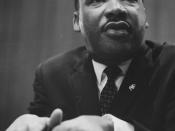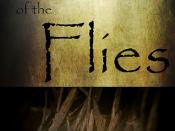I remember my mother telling me the story of Moses and his people. ÃÂGod had a greatdestiny for Moses. Moses was the son of a Pharaoh but sympathized for the Hebrew slaves ofwhom he were of descent. For this he was cast out of Egypt and for this he was chosen by Godto lead his people out of slavery to the freedom of the Promise Land. To the Pharaoh he shouted,ÃÂLet My People Go!ÃÂ, but the pharaoh saw only the need of his city to be built and ignored whatMoses said. The story was something along those lines. As a child, I wondered why the PharaohwouldnÃÂt listen to Moses. To me it seemed like common sense and I often reassured my self thatif I was ever in the same situation that I would do the right thing, which at that time seemed veryclear. Of course at that time I only understood the essence of human morality.
Now of course Iunderstand that even more than greed or the concept of conventional slavery, the Pharaoh didnÃÂtwant to acknowledge a being higher than himself. If the idea of a person does not conform withthe rest of society or superiors, they are subject to be outcast.
William GoldingÃÂs novel, Lord of the Flies, uses Simon a ÃÂSkinny, Vivid little boyÃÂ (24) torepresent Visionaries in our Society. Simon from the start of the novel was different, which did notsit well with the boys. Likewise, in society we see difference as something that makes us nervous.
What about difference puts us out of our comfort circle? When Simon suggested the concept ofthe ÃÂit (ie.beast) [being] only [them]ÃÂ he was laughed at. Society does not like things that aredisturbing; we rely on comforting conventions amongst ourselves. In the case of the boys theirconvention was sanity; the...


